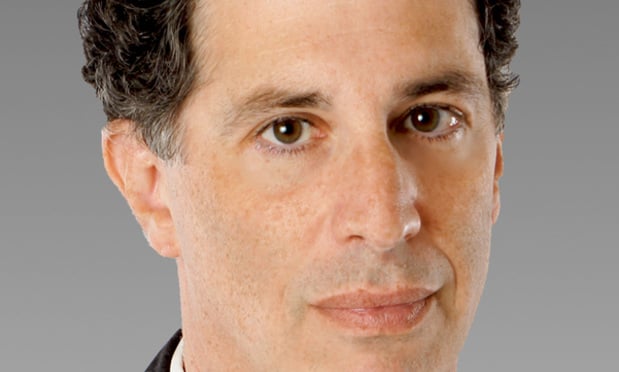Kristie Rearick
Kristie Rearick is the magazines and publications editor at The Legal Intelligencer. She handles contributed content for the newspaper. Contact her [email protected].

March 22, 2018 | Daily Business Review
Community Banks Should Consider Ditching Their Bank Holding CompaniesOne of the most significant issues impacting community banks over the last decade has been the effect of increased regulation on community banks' bottom lines.
By Gustav L. Schmidt
5 minute read

March 22, 2018 | The Legal Intelligencer
Ethics Forum: Questions and Answers on Professional ResponsibilityI represented a client on a minor matter and I missed the statute of limitations. The value of the case is about $4,000 or $5,000. I brought the client in and reached an agreement to settle the case for the client for $3,500 with a release from liability. The client is happy. Did I do anything wrong?
By Samuel C. Stretton
8 minute read

March 22, 2018 | The Legal Intelligencer
Why I Moved Laterally: It Was About More Than Money. Technology and the ease with which people can travel is shrinking the world in which we live; and other market forces are being fundamentally altered by the way people view the world. For this reason, an accomplished legal career looks significantly different than it did 10 years ago. Because lawyers are using different metrics to evaluate success, law firms must do the same to maintain longevity.
By Joshua C. Quinter
6 minute read

March 21, 2018 | The Legal Intelligencer
Silence Is Your Secret Weapon: Use It to Gain InsightIf you want to get more information, better intelligence and clarity, consider allowing silence to play a supporting role in your communication style. It can be used to great effect.
By Dena Lefkowitz
7 minute read

March 21, 2018 | The Legal Intelligencer
Best Practices to Promote Lateral Partner IntegrationLateral hiring continues to be a central strategy in how law firms grow. According to a recent legal-industry transition survey for 2017, more than 95 percent of law firms indicated lateral growth was a key initiative, but it's a strategy full of risk, unknowns and pitfalls.
By Jessica L. Gangjee
7 minute read

March 21, 2018 | Daily Business Review
IRS Virtual Currency Amnesty? Not So Fast!Many taxpayers jumped into virtual currency investing during 2017. They might now be asking themselves: Will the IRS know if I made money with Bitcoin (or other virtual currencies)? Do I have to report my gains or losses? Are virtual currency transactions reportable? Yes, Yes and Yes.
By Stanley Foodman
5 minute read

March 20, 2018 | The Legal Intelligencer
Future of Lateral Moves: Practice Area, Geography and Economics Remain ImportantTaking a look at emerging trends in lateral moves, can we predict for the near future that firms will more likely grow through larger groups or through individual hires? Well, as my accounting professor liked to say: It depends.
By Steven Kruza
6 minute read

March 20, 2018 | The Legal Intelligencer
What to Do When the Patent Office Says 'No'According to the U.S. Supreme Court, a patent application is one of the most difficult legal instruments that can be drafted (Topliff v. Topliff, 145 U.S. 156 (1892)). Small wonder that most patent applications are initially rejected by the Patent Office.
By Lawrence E. Ashery
6 minute read

March 19, 2018 | The Legal Intelligencer
Responsibilities of Airlines to Provide Safe Travel for AnimalsTraveling with a pet can create quite the dilemma. Many pet owners are reluctant to leave their pets behind when they travel, but traveling by air can be both stressful and, at times, dangerous for pets.
By Penny Conly Ellison
7 minute read

March 19, 2018 | The Legal Intelligencer
Don't Like An Award From Compulsory Arbitration? You Must Appeal.Can a party to a case where a judgment has been entered in compulsory arbitration have that judgment modified without appealing? This is the underlying question in the recent matter heard by the Pennsylvania Superior Court, captioned as Blucas v. Agiovlasitis, 2018 Pa.Super. 25.
By James W. Cushing
4 minute read
Trending Stories
- 1'It's Not Going to Be Pretty': PayPal, Capital One Face Novel Class Actions Over 'Poaching' Commissions Owed Influencers
- 211th Circuit Rejects Trump's Emergency Request as DOJ Prepares to Release Special Counsel's Final Report
- 3Supreme Court Takes Up Challenge to ACA Task Force
- 4'Tragedy of Unspeakable Proportions:' Could Edison, DWP, Face Lawsuits Over LA Wildfires?
- 5Meta Pulls Plug on DEI Programs
More from ALM
- Scan In Progress: Litigators Leverage AI to Screen Prospective Jurors 1 minute read
- Legal Speak at General Counsel Conference East 2024: Match Group's Katie Dugan & Herrick's Carol Goodman 1 minute read
- Legal Speak at General Counsel Conference East 2024: Eric Wall, Executive VP, Syllo 1 minute read



